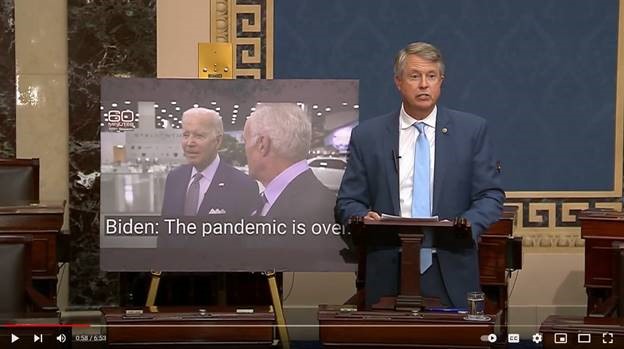- November 16, 2022
Senator Marshall’s Resolution to End COVID National Emergency Declaration Overwhelmingly Passes Senate
White House Immediately Issues Veto Threat
(Washington, D.C., November 15, 2022) – This evening, by a bipartisan vote of 62-36, the U.S Senate passed U.S. Senator Roger Marshall’s, M.D. resolution to end the COVID-19 national state of emergency currently in effect under the National Emergencies Act (NEA). Senator Marshall’s resolution followed President Joe Biden’s comments that the coronavirus pandemic is over, yet the national emergency for COVID-19 has yet to be terminated by the White House. Immediately after Senator Marshall’s resolution passed the Senate, the White House threatened to veto the measure.
Senator Marshall spoke on the Senate floor this evening to force a vote on his legislation. While you may click HERE or on the image below to watch Senator Marshall’s speech, he said in part,
“…Just two months ago, the President stated the coronavirus pandemic was “over” in a 60 Minutes interview… Yet despite all the advances we’ve made in our fight against the virus and the victorious declaration by our Chief Executive, this administration insists the national emergency declaration remain in place… it was this government imposed state of emergency that justified their continued lockdowns of small businesses and schools… that justified their mask and vaccine mandates, including a military vaccine mandate that has resulted in the removal of more than 8,000 active-duty troops… that justified President Biden and Congressional Democrats spending binge, increasing the total amount of government spending by more than $9 trillion since February 2021 and lighting the fire for record inflation… that the President has used as justification to extend the payment pause and cancel up to $10,000 in outstanding federally held student loan balances, and even a more generous $20,000 for Pell Grant recipients… Congress must take the responsible action of reigning in this massive expansion of government and restore Americans fundamental rights by terminating the COVID-19 national emergency declaration…”
You may click HERE to view Senator Marshall’s remarks as prepared.
Background:
In March 2020, President Donald Trump invoked the National Emergencies Act (NEA) in regard to COVID-19. In February 2021 and then again in February 2022, President Joe Biden extended it. A provision in the NEA grants Congress termination review of national emergencies, stating that after six months, and every six months after the emergency continues, “each House of Congress shall meet to consider a vote on a joint resolution to determine whether the emergency shall be terminated.” However, Congressional interpretation of this law has determined that the absence of a resolution introduced by any member signals unanimous consent for continuation. In failing to meet, debate, and vote on an emergency, Congress is effectively ceding more unchecked emergency powers to the executive similar to its failure to enforce War Powers provisions.
On March 3, 2022, Senator Marshall’s resolution to end the COVID-19 national state of emergency passed the Senate by a vote of 48-47. On that same day, the White House issued a veto threat of Sen. Marshall’s resolution, and the U.S. House of Representatives failed to take up the measure. Under the NEA, Congress is mandated to determine whether the emergency should continue, a process Congress has not fully enforced, ceding power to the executive. You may click HERE to view the resolution. Senators Mike Braun (IN), Mike Lee (UT), Ted Cruz (TX), and Rand Paul (KY) Rick Scott (FL), Steve Daines (MT), Ron Johnson (WI), Mike Crapo (ID), and James Risch (ID) cosponsored Senator Marshall’s resolution. The NEA outlines an expedited parliamentarian procedure for emergency termination resolutions. Once the resolution is introduced and approved by the parliamentarian, it is referred to the Committee of jurisdiction, the Senate Committee on Finance in this instance. The committee of referral is to report one joint resolution along with its recommendations within 15 calendar days after the day of referral, unless the chamber “shall otherwise determine by the yeas and nays.” Once reported, the terminating resolution “shall become the pending business” of the chamber and a vote on final passage is to occur within three calendar days thereafter (unless the chamber “shall otherwise determine by yeas and nays”).
###

